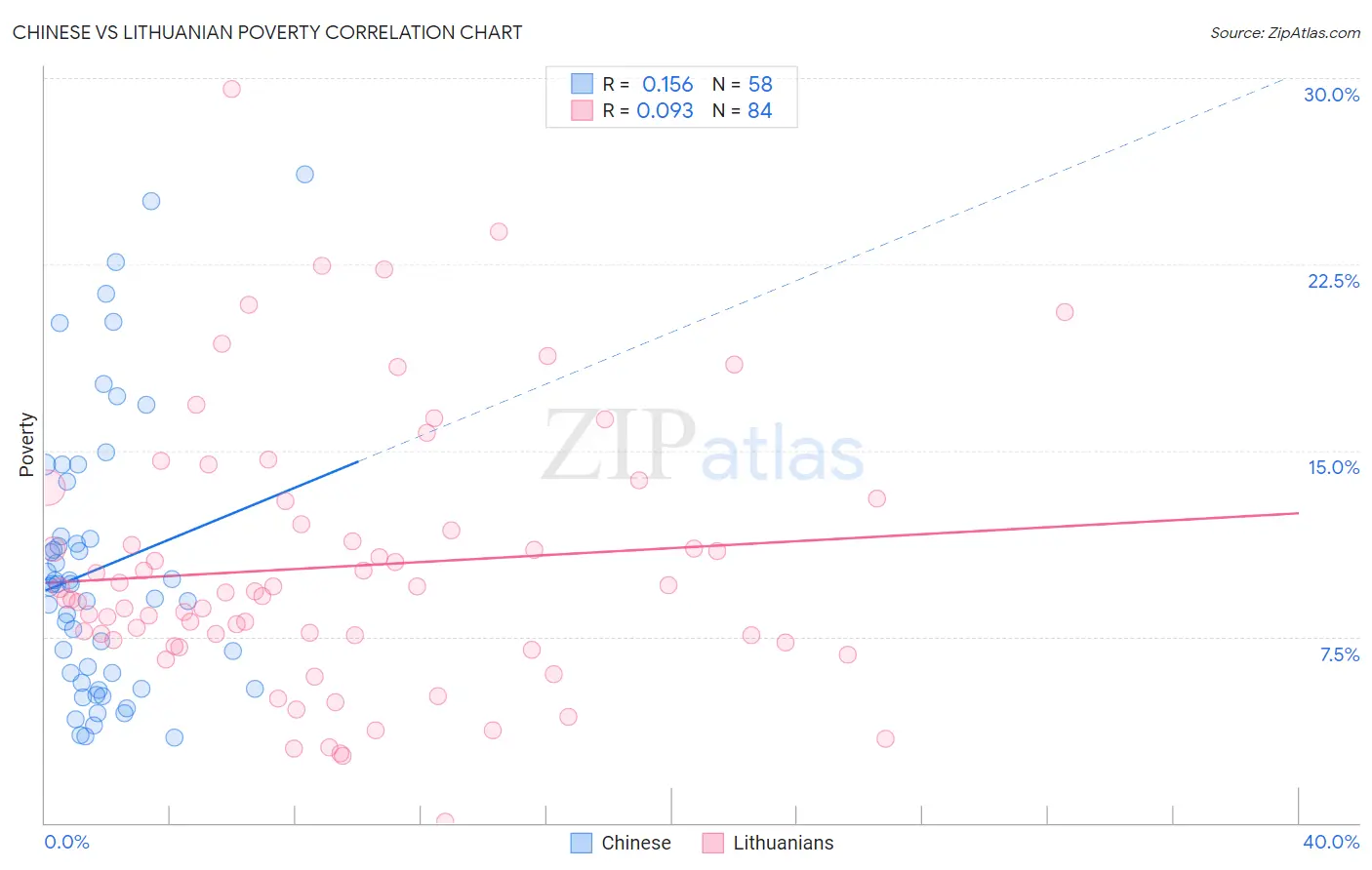Chinese vs Lithuanian Poverty
COMPARE
Chinese
Lithuanian
Poverty
Poverty Comparison
Chinese
Lithuanians
9.5%
POVERTY
100.0/ 100
METRIC RATING
2nd/ 347
METRIC RANK
10.5%
POVERTY
99.8/ 100
METRIC RATING
16th/ 347
METRIC RANK
Chinese vs Lithuanian Poverty Correlation Chart
The statistical analysis conducted on geographies consisting of 64,802,428 people shows a poor positive correlation between the proportion of Chinese and poverty level in the United States with a correlation coefficient (R) of 0.156 and weighted average of 9.5%. Similarly, the statistical analysis conducted on geographies consisting of 421,719,572 people shows a slight positive correlation between the proportion of Lithuanians and poverty level in the United States with a correlation coefficient (R) of 0.093 and weighted average of 10.5%, a difference of 9.7%.

Poverty Correlation Summary
| Measurement | Chinese | Lithuanian |
| Minimum | 3.4% | 0.071% |
| Maximum | 26.1% | 29.6% |
| Range | 22.7% | 29.5% |
| Mean | 10.2% | 10.3% |
| Median | 9.6% | 9.2% |
| Interquartile 25% (IQ1) | 5.6% | 7.3% |
| Interquartile 75% (IQ3) | 11.6% | 12.5% |
| Interquartile Range (IQR) | 5.9% | 5.2% |
| Standard Deviation (Sample) | 5.6% | 5.4% |
| Standard Deviation (Population) | 5.5% | 5.4% |
Demographics Similar to Chinese and Lithuanians by Poverty
In terms of poverty, the demographic groups most similar to Chinese are Thai (9.6%, a difference of 0.45%), Immigrants from Taiwan (9.7%, a difference of 1.9%), Immigrants from Ireland (10.1%, a difference of 5.6%), Immigrants from India (9.0%, a difference of 5.6%), and Assyrian/Chaldean/Syriac (10.1%, a difference of 5.8%). Similarly, the demographic groups most similar to Lithuanians are Bolivian (10.4%, a difference of 0.30%), Immigrants from Bolivia (10.4%, a difference of 0.31%), Norwegian (10.5%, a difference of 0.37%), Latvian (10.5%, a difference of 0.46%), and Immigrants from Hong Kong (10.4%, a difference of 0.62%).
| Demographics | Rating | Rank | Poverty |
| Immigrants | India | 100.0 /100 | #1 | Exceptional 9.0% |
| Chinese | 100.0 /100 | #2 | Exceptional 9.5% |
| Thais | 100.0 /100 | #3 | Exceptional 9.6% |
| Immigrants | Taiwan | 100.0 /100 | #4 | Exceptional 9.7% |
| Immigrants | Ireland | 99.9 /100 | #5 | Exceptional 10.1% |
| Assyrians/Chaldeans/Syriacs | 99.9 /100 | #6 | Exceptional 10.1% |
| Filipinos | 99.9 /100 | #7 | Exceptional 10.1% |
| Maltese | 99.9 /100 | #8 | Exceptional 10.2% |
| Immigrants | South Central Asia | 99.9 /100 | #9 | Exceptional 10.2% |
| Bulgarians | 99.9 /100 | #10 | Exceptional 10.2% |
| Immigrants | Lithuania | 99.9 /100 | #11 | Exceptional 10.3% |
| Bhutanese | 99.8 /100 | #12 | Exceptional 10.4% |
| Immigrants | Hong Kong | 99.8 /100 | #13 | Exceptional 10.4% |
| Immigrants | Bolivia | 99.8 /100 | #14 | Exceptional 10.4% |
| Bolivians | 99.8 /100 | #15 | Exceptional 10.4% |
| Lithuanians | 99.8 /100 | #16 | Exceptional 10.5% |
| Norwegians | 99.8 /100 | #17 | Exceptional 10.5% |
| Latvians | 99.8 /100 | #18 | Exceptional 10.5% |
| Immigrants | Scotland | 99.7 /100 | #19 | Exceptional 10.6% |
| Immigrants | North Macedonia | 99.7 /100 | #20 | Exceptional 10.6% |